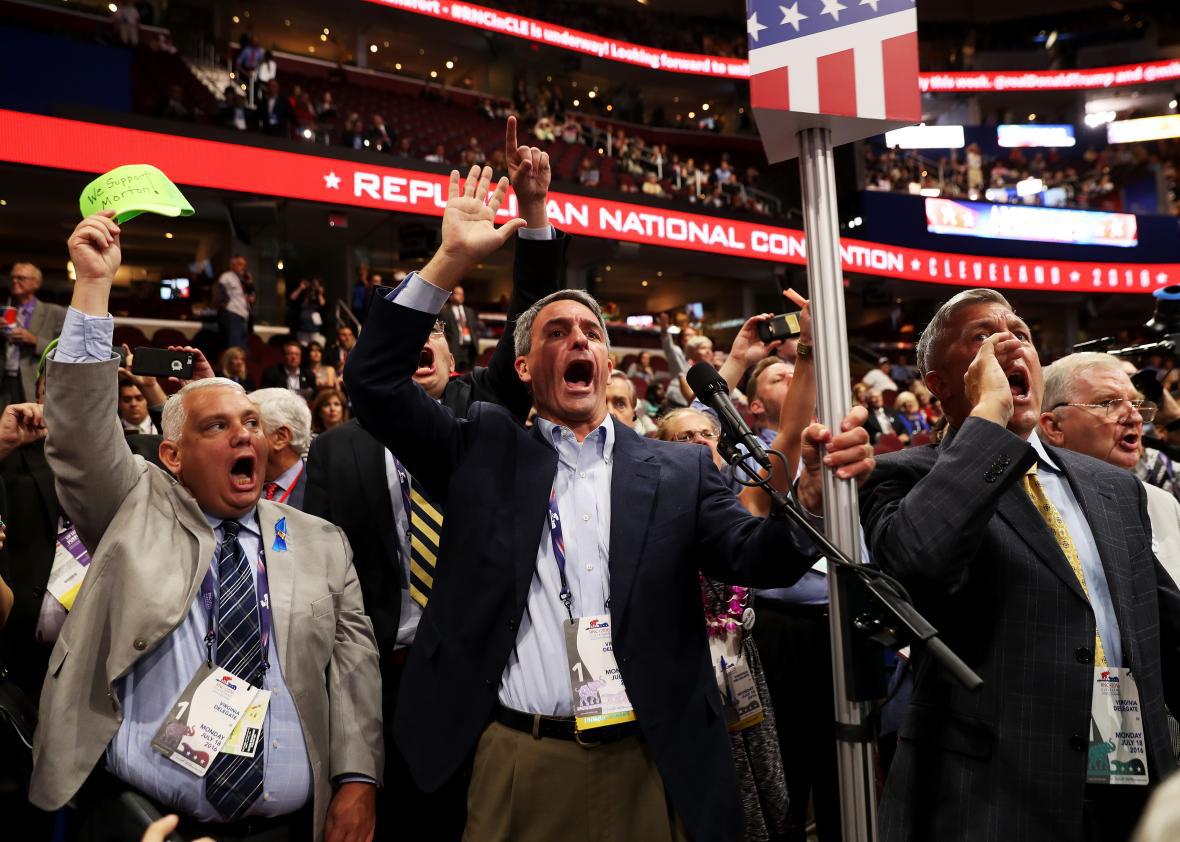CLEVELAND—Tuesday’s program at the Republican National Convention includes the roll call of the states, when the delegates actually cast their votes to nominate a presidential candidate. Since the vast majority of delegates are bound, there’s really no need for this in-person ceremony of humans shouting out their required votes, other than to offer each delegation a 20-second pitch about the greatness of their home state. The RNC and the Trump campaign would quite prefer that there be no opportunity for nationally televised human agency and that a final vote be announced simply, with no frills. Because there will still be anti-Trumpers, spurned, looking to humiliate the Trump-RNC axis.
If anti-Trump delegates, after getting rolled in controversial fashion on Monday, try to make a fuss during the roll call of the states, what would that look like? The important rule here is 37(b), which governs the process for roll call votes (emphasis mine):
In the balloting, the vote of each state shall be announced by the chairman of such state’s delegation […] and in case the vote of any state shall be divided, the chairman shall announce the number of votes for each candidate […] but if exception is taken by any delegate from that state to the correctness of such announcement by the chairman of that delegation, the chairman of the convention shall direct the roll of members of such delegation to be called, and then shall report back to the result to the convention at the conclusion of the balloting by the other states.
There’s a new line in 37(b) this year that makes it clear the contested count would not allow objecting delegates to break from their binding obligations.
The leaders of the anti-Trump delegate resistance, like Colorado’s Kendal Unruh, are going to try anyway. “Unruh contends,” as Mother Jones reports, “that there is nothing a state can do, and little the national party or state parties can do, to sanction rank and file delegates if they want to challenge this rule individually and vote their conscience.” Those conscience votes wouldn’t be counted, but, as Mother Jones adds, the “televised show of dissent will be an embarrassment to the Trump campaign and tarnish the image of unity the Republican National Committee is struggling to project this week.” With the new rules package adopted and anti-Trumpers out of formal means for challenging Trump’s nomination, the only good option left is trolling from the margins of Robert’s Rules of Order.
“We are going to be sending out to every delegation what their rights are,” says Dane Waters, head of Delegates Unbound, a group pushing the idea that delegates are free to vote their will at the convention. “And one thing that every delegation should demand is that they are entitled by 37(b) a ballot—a private, secret ballot to vote how they want to.” He concedes that those ballots wouldn’t be counted officially; the convention secretary would just go ahead and register bound commitments.
It’s unclear how all the delegations with anti-Trump contingents will play it Tuesday afternoon. And it should be clarified that not all the delegates furious over Monday’s rules vote are anti-Trump. Ken Cuccinelli, the former Virginia attorney general who threw his delegate credentials on the ground Monday in anger over the vote, was upset over other parts of the rules package centralizing RNC authority in the chairman—not because he was spearheading an anti-Trump coup. I ran into him outside the perimeter of the convention Monday, where he was finishing up an interview with MSNBC’s Chris Hayes. When I asked if his delegation would try something during the roll call, he raged at the media narrative that he and his Old Dominion delegation in toto were against Trump. (He would later apologize for getting angry at me as a stand-in for all media, which was ‘right gentlemanly of him.) He explained that there are only a couple of true anti-Trumpers in the Virginia delegation—far fewer than there are in, say, Utah and Colorado.
What are the Trump campaign and the RNC to do to avoid a second straight day of floor mess—and this time not on a drab rules package, but on Trump’s nomination itself? They could shut off protesting delegates’ microphones or engage in some vicious arm-twisting with unruly delegations’ leaders, again. Dane Waters suggested that it’s possible the RNC could go nuclear and move to nominate Trump by acclamation—i.e., a voice vote that the convention chair gavels in for the yeas—which would circumvent a lot of trouble. But a representative for the RNC, when asked about the possibility of such a motion, insisted that a “full roll call for president is required by the rules.”
That means the RNC and Trump, to some extent, will have to live with a final wave of showy antics before Trump is officially the nominee.
“Big things happening in the Arena later,” Delegates Unbound texted reporters around 3 p.m. “We’ll see you there.”
